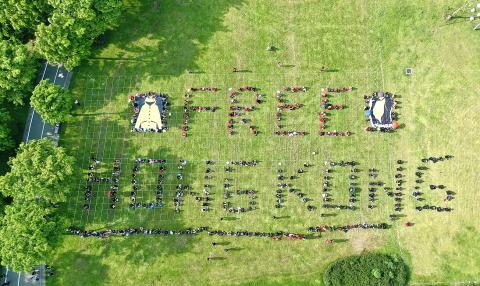About 300 people took part in a demonstration in support of pro-democracy protesters in Hong Kong, spelling out the words “Free Hong Kong” with their bodies in Taipei’s Central Art Park.
The event was organized by Hong Kong Outlanders, the Taiwan Youth Association for Democracy, Taiwan Association for Human Rights, Taiwan Citizen Front, Covenants Watch, the Presbyterian Church in Taiwan and several human rights groups.
In addition to the words, an image of Taiwan and one of “Raincoat Man” — honoring Marco Leung (梁凌杰), a Hong Konger who died on June 15 wearing a yellow rain poncho after falling from construction scaffolding in front of Pacific Place in the Admiralty district while hanging protest banners, were displayed.

Photo: Peter Lo, Taipei Times
The image shows that the public in Taiwan fully supports the people in Hong Kong in their pursuit of freedom, democracy and the rule of law, the organizers said.
As Hong Kong police continue to use excessive force to break up the continuing protests, and have even arrested pedestrians who were just shopping, Taiwan Association for Human Rights Secretary-General Chiu Ee-ling (邱伊翎) said the police have impeded press freedom, handled female protestors humiliatingly and arrested and pressed charges against minors.
The police have violated the Convention on the Elimination of All Forms of Discrimination Against Women and Convention on the Rights of the Child, she added.
A Hong Kong Outlanders representative, who identified himself as “Kuma,” said the Hong Kong government claimed that a general strike staged on Monday last week was aimed at destroying the territory’s economy by dividing the people.
“However, a stable economy should be founded on a free and democratic society. If Hong Kong loses this foundation, the assets owned by the Hong Kong people could disappear overnight. As Hong Kongers living in Taiwan, we support every citizen of Hong Kong who went on strike and walked out of classes last week, as they spoke out by taking actions against a twisted social order. They might miss a day’s work and miss a meal, but the fall of Hong Kong would be irreversible,” he said.
Hong Kongers decided to take to the streets day and night because their democratic system has been greatly eroded, and problems generated by ineffective government and an out-of-control police force cannot be addressed through the political system, he said.
Eve Lui (呂天忻), who represents Hong Kong Higher Institutions International Affairs Delegations, said Taiwan has witnessed how Hong Kong has fallen from a free and democratic state into an undemocratic one since 1997.
“Our elected legislators were being disqualified, our book publishers were kidnapped and our social activists were arrested and locked in prisons. A general election is still impossible for us, and Hong Kong is still ruled by a puppet from Beijing,” she said.
Participant Michelle Wu (吳奕柔) said that Beijing was ignoring “the Hong Kongers’ insistence that the territory maintain a free and democratic system.”

DAREDEVIL: Honnold said it had always been a dream of his to climb Taipei 101, while a Netflix producer said the skyscraper was ‘a real icon of this country’ US climber Alex Honnold yesterday took on Taiwan’s tallest building, becoming the first person to scale Taipei 101 without a rope, harness or safety net. Hundreds of spectators gathered at the base of the 101-story skyscraper to watch Honnold, 40, embark on his daredevil feat, which was also broadcast live on Netflix. Dressed in a red T-shirt and yellow custom-made climbing shoes, Honnold swiftly moved up the southeast face of the glass and steel building. At one point, he stepped onto a platform midway up to wave down at fans and onlookers who were taking photos. People watching from inside

MAKING WAVES: China’s maritime militia could become a nontraditional threat in war, clogging up shipping lanes to prevent US or Japanese intervention, a report said About 1,900 Chinese ships flying flags of convenience and fishing vessels that participated in China’s military exercises around Taiwan last month and in January last year have been listed for monitoring, Coast Guard Administration (CGA) Deputy Director-General Hsieh Ching-chin (謝慶欽) said yesterday. Following amendments to the Commercial Port Act (商港法) and the Law of Ships (船舶法) last month, the CGA can designate possible berthing areas or deny ports of call for vessels suspected of loitering around areas where undersea cables can be accessed, Oceans Affairs Council Minister Kuan Bi-ling (管碧玲) said. The list of suspected ships, originally 300, had risen to about

A Vietnamese migrant worker yesterday won NT$12 million (US$379,627) on a Lunar New Year scratch card in Kaohsiung as part of Taiwan Lottery Co’s (台灣彩券) “NT$12 Million Grand Fortune” (1200萬大吉利) game. The man was the first top-prize winner of the new game launched on Jan. 6 to mark the Lunar New Year. Three Vietnamese migrant workers visited a Taiwan Lottery shop on Xinyue Street in Kaohsiung’s Gangshan District (崗山), a store representative said. The player bought multiple tickets and, after winning nothing, held the final lottery ticket in one hand and rubbed the store’s statue of the Maitreya Buddha’s belly with the other,

Japan’s strategic alliance with the US would collapse if Tokyo were to turn away from a conflict in Taiwan, Japanese Prime Minister Sanae Takaichi said yesterday, but distanced herself from previous comments that suggested a possible military response in such an event. Takaichi expressed her latest views on a nationally broadcast TV program late on Monday, where an opposition party leader criticized her for igniting tensions with China with the earlier remarks. Ties between Japan and China have sunk to the worst level in years after Takaichi said in November that a hypothetical Chinese attack on Taiwan could bring about a Japanese